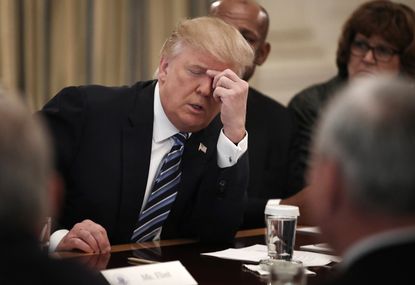President Trump just suffered a massive loss in court. Here's what it means.
The Circuit Court had a clear message for President Trump: You are not king, and we will not be moved


Americans by the tens of thousands — and perhaps hundreds of thousands — tuned in Tuesday to a dense one hour and eight minutes of legal and policy arguments about President Trump's executive order on immigration. The grainy audio served as a civics lesson for the digital age.
On Thursday evening, the 9th Circuit Court of Appeals gave America's 45th president a civics lessons of his own, ruling 3-0 to uphold the suspension of Trump's unilateral order that tried to keep refugees and travelers from seven Muslim-majority countries from entering the United States. Our president's response: raging in all-caps on Twitter.
Here are some key lessons and implications:
Subscribe to The Week
Escape your echo chamber. Get the facts behind the news, plus analysis from multiple perspectives.

Sign up for The Week's Free Newsletters
From our morning news briefing to a weekly Good News Newsletter, get the best of The Week delivered directly to your inbox.
From our morning news briefing to a weekly Good News Newsletter, get the best of The Week delivered directly to your inbox.
1. The decision was unanimous. One of the judges were appointed by a Republican, and two appointed by Democrats. There is no substantive argument to make that their ruling was small-p political.
2. The ruling was, however, large-P Political — a stinging slap-down of President Trump's efforts to influence or intimidate the judiciary — as much as it was a direct rejection of his assertion that the executive branch has virtually untrammeled authority to control who and how people get into the country.
3. The text of the decision includes citations from Trump advisers. This means, in essence, that everything Trump's advisers say about how policy gets made in the Trump administration is fair game for scrutiny.
4. The text of the decision includes Trump's own words about a Muslim ban. This means that everything Trump had said or will say about this policies is fair game for scrutiny.
5. The court looked at the merits of the argument, which means that, according to legal commentators, they wrote their opinion with an eye toward the Supreme Court, which seems like the ultimate destination for this fight.
6. The court did not cite public opinion, nor did it reference the massive protests against Trump's order. (They did mention the confusion at airports.) This suggests that they did not want to create the impression that they bent to the public outcry.
7. The decision will still fortify the Trump resistance, especially the activist groups who are organizing their entire business models around his policy decisions. I've already seen several memes online suggesting that the popular uprising worked, and that it should continue. Whether or not the demonstrations actually influenced the judges, the resistance movement will assume that, at the very least, their protests did not hurt the cause.
8. The Justice Department asked the court to lift the stay because it was "overbroad," but also (and primarily) because they believe the president has an inherent, broad power to determine what constitutes a national security threat. The scope of such power, the Justice Department asserted, is basically non-justiciable, absent extraordinary circumstances. Trump's DOJ lawyers effectively argued that Judges shouldn't second-guess the president's national security decisions.
The 9th Circuit disagreed.
"Although we owe considerable deference" to the executive branch on this matter, it is "beyond question that the judges have the authority to adjudicate constitutional questions on executive actions," the court wrote.
9. This argument between branches isn't new; it served as the point of debate for many cases that President Obama fought against the ACLU and other plaintiffs during his two terms. But Trump gives these disagreements a new dimension. His carelessness with the facts, his bullying, and his hectoring has now been used against him. His words and actions are responsible for the overreach and for the set of facts that caused the judges to assert their power.
Trump brought this upon himself.
Create an account with the same email registered to your subscription to unlock access.
Sign up for Today's Best Articles in your inbox
A free daily email with the biggest news stories of the day – and the best features from TheWeek.com
Marc Ambinder is TheWeek.com's editor-at-large. He is the author, with D.B. Grady, of The Command and Deep State: Inside the Government Secrecy Industry. Marc is also a contributing editor for The Atlantic and GQ. Formerly, he served as White House correspondent for National Journal, chief political consultant for CBS News, and politics editor at The Atlantic. Marc is a 2001 graduate of Harvard. He is married to Michael Park, a corporate strategy consultant, and lives in Los Angeles.
-
 The new powers to stop stalking in the UK
The new powers to stop stalking in the UKThe Explainer Updated guidance could help protect more victims, but public is losing trust in police and battered criminal justice system
By Harriet Marsden, The Week UK Published
-
 'Criminal trail?'
'Criminal trail?'Today's Newspapers A roundup of the headlines from the US front pages
By The Week Staff Published
-
 Grindr 'shared user HIV status' with ad firms, lawsuit claims
Grindr 'shared user HIV status' with ad firms, lawsuit claimsSpeed Read LGBTQ dating app accused of breaching UK data protection laws in case filed at London's High Court
By Rebecca Messina, The Week UK Published
-
 Arizona court reinstates 1864 abortion ban
Arizona court reinstates 1864 abortion banSpeed Read The law makes all abortions illegal in the state except to save the mother's life
By Rafi Schwartz, The Week US Published
-
 Trump, billions richer, is selling Bibles
Trump, billions richer, is selling BiblesSpeed Read The former president is hawking a $60 "God Bless the USA Bible"
By Peter Weber, The Week US Published
-
 The debate about Biden's age and mental fitness
The debate about Biden's age and mental fitnessIn Depth Some critics argue Biden is too old to run again. Does the argument have merit?
By Grayson Quay Published
-
 How would a second Trump presidency affect Britain?
How would a second Trump presidency affect Britain?Today's Big Question Re-election of Republican frontrunner could threaten UK security, warns former head of secret service
By Harriet Marsden, The Week UK Published
-
 'Rwanda plan is less a deterrent and more a bluff'
'Rwanda plan is less a deterrent and more a bluff'Instant Opinion Opinion, comment and editorials of the day
By The Week UK Published
-
 Henry Kissinger dies aged 100: a complicated legacy?
Henry Kissinger dies aged 100: a complicated legacy?Talking Point Top US diplomat and Nobel Peace Prize winner remembered as both foreign policy genius and war criminal
By Harriet Marsden, The Week UK Last updated
-
 Trump’s rhetoric: a shift to 'straight-up Nazi talk'
Trump’s rhetoric: a shift to 'straight-up Nazi talk'Why everyone's talking about Would-be president's sinister language is backed by an incendiary policy agenda, say commentators
By The Week UK Published
-
 More covfefe: is the world ready for a second Donald Trump presidency?
More covfefe: is the world ready for a second Donald Trump presidency?Today's Big Question Republican's re-election would be a 'nightmare' scenario for Europe, Ukraine and the West
By Sorcha Bradley, The Week UK Published